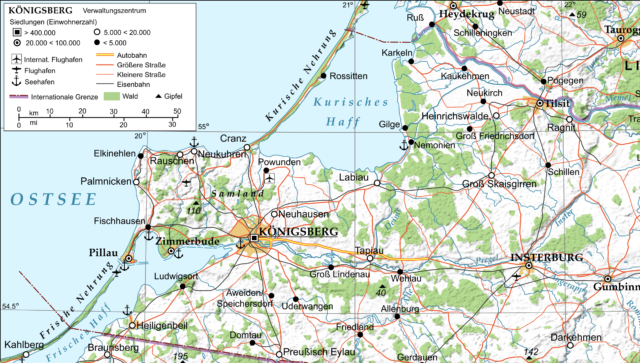
Lithuania and Poland Want to ‘Recover’ Kaliningrad, Russian Analysts Say
Publication: Eurasia Daily Monitor Volume: 18 Issue: 166
By:

Since Soviet times, Russian analysts have mused about the possibility that Germany might try to recover Kaliningrad, or East Prussia as it was known before Joseph Stalin seized it at the end of World War II. Later, during the 1990s, they focused on the risk that the non-contiguous Russian oblast might break away and form a fourth Baltic republic. Most recently, they have suggested that in the event of a military conflict between Moscow and the West, the North Atlantic Treaty Organization (NATO) might seize Kaliningrad in order to launch a broader attack on the Russian Federation (see EDM August 2, 2017, July 6, 2019, October 12, 2021). These concerns, apparently, have not disappeared. But they have been joined and even eclipsed by others, including fears that Lithuania and Poland supposedly have their own plans for undermining Moscow’s control of the oblast, hoping to eventually seize it for themselves. Both of these neighboring Baltic littoral countries have viewed the territory presently occupied by Kaliningrad as historically theirs.
Such Russian discussions have increased in frequency and volume in recent weeks for three interrelated reasons. First, relations between Moscow and these two governments have deteriorated as Vilnius and Warsaw have taken increasingly anti-Russian positions: accusing Lithuania and Poland of planning to seize part of Russia is a useful propagandistic and political tool for those who want a tougher Russian policy toward the two. Second, focusing on those two countries rather than Germany avoids attacking Berlin, with which Moscow hopes to develop even closer ties. And third—and perhaps most importantly—concerns about Poland and Lithuania are part of the view of many in Moscow that Russia must integrate Belarus not only to support Vladimir Putin’s vision of a new empire but also to protect Kaliningrad as an inalienable part of the Russian Federation (see Jamestown.org, January 29, 2021).
In mid-October, RuBaltic.ru, a pro-Russian portal directed at the Baltic countries, released a 60-page report outlining what it believes to be Lithuania’s plan to seize all or part of Kaliningrad with the help of NATO (RuBaltic.ru, October 20, 2021). Written by Aleksandr Nosovich, a notoriously anti-Baltic Russian analyst, the report argues that many Lithuanians continue to view the eastern half of Kaliningrad as “Lithuania Minor,” a core part of their historical space, even though this territory was never part of any modern Lithuanian state. Moreover, he suggests that Vilnius has been egged on by the United States and “anti-Russian centers” like The Jamestown Foundation. Nosovich claims that some US analysts have suggested that, in the event of a Russian collapse, what is now Kaliningrad should be handed over to Warsaw and incorporated into Poland (RuBaltic.ru, October 27).
According to the analyst, some Lithuanian leaders believe that so long as Kaliningrad remains in Russian hands, it will be a threat to Europe and that demilitarizing that territory is only possible if it is handed over to other powers, including Lithuania and Poland. Baltic leaders believe Russia does not have the right to keep the land now that more than 50 years have passed since Moscow was given temporary control over Kaliningrad—a grace period that was supposed to end in 1995. In Nosovich’s words, “of all the European countries, Lithuania has more rights to Kaliningrad oblast than anyone else” because the eastern portions of the Russian oblast were centers where Lithuanian national culture arose and are still referred to by Lithuanians as Lithuania Minor. Indeed, talk about that historical period still echoes in the political programs of many parties in the Lithuanian political system.
Yet “objective” historians, Nosovich continues, reject all of this. Russian writers are especially furious at Vilnius for promoting the idea that the advance of the Red Army into East Prussia, the area that mostly became Kaliningrad, was not so much about the defeat of Adolf Hitler’s armies as an act of “genocide” against the people of Königsberg, many of whom had close ties to Lithuania and to a lesser extent to Poland (RuBaltic.ru, accessed November 2). Such views, he says, are not marginal in Vilnius. Instead, they are “either official or semi-official” and thus reflect the real thinking of the Lithuanian political class. But he argues that they can play this role only because the United States backs this Lithuanian vision as part of its supposed plans to seize Kaliningrad and dismember Russia (RuBaltic.ru, October 27).
Lithuania is not the only country interested in seizing Kaliningrad, some Russian analysts contend. For example, Moscow-based defense commentator Aleksandr Sitnikov argues on the Svobodnaya Pressa portal that Poland’s plans to expand its military dramatically over the coming years are intended to give it the capacity to challenge Russia and to claim a major territorial prize in the event of a conflict between Russia and the West. That prize, the expert says, is Polish control of all or part of Kaliningrad, which many in the Polish government see as both a threat to their country as long as it is in Russian hands and an opportunity for Poland to expand and play a dominant role in Central Eastern Europe in the future (Sbobodnaya Pressa, November 2).
Most casual readers of such articles will dismiss them as the products of the overheated Russian political commentariat; but even if they do not accurately reflect what Lithuania or Poland plans, these pieces say a great deal about how Russians view this region. Moscow hopes to blacken the reputation of both countries and isolate them from the West. As such, they are critically important indicators of the direction Moscow (and its propaganda) is moving—toward weakening the Western alliance by suggesting that some of its members have broader goals that will only land the remaining members in difficulty. These narratives constitute a Russian challenge that the West must recognize and respond to collectively.



